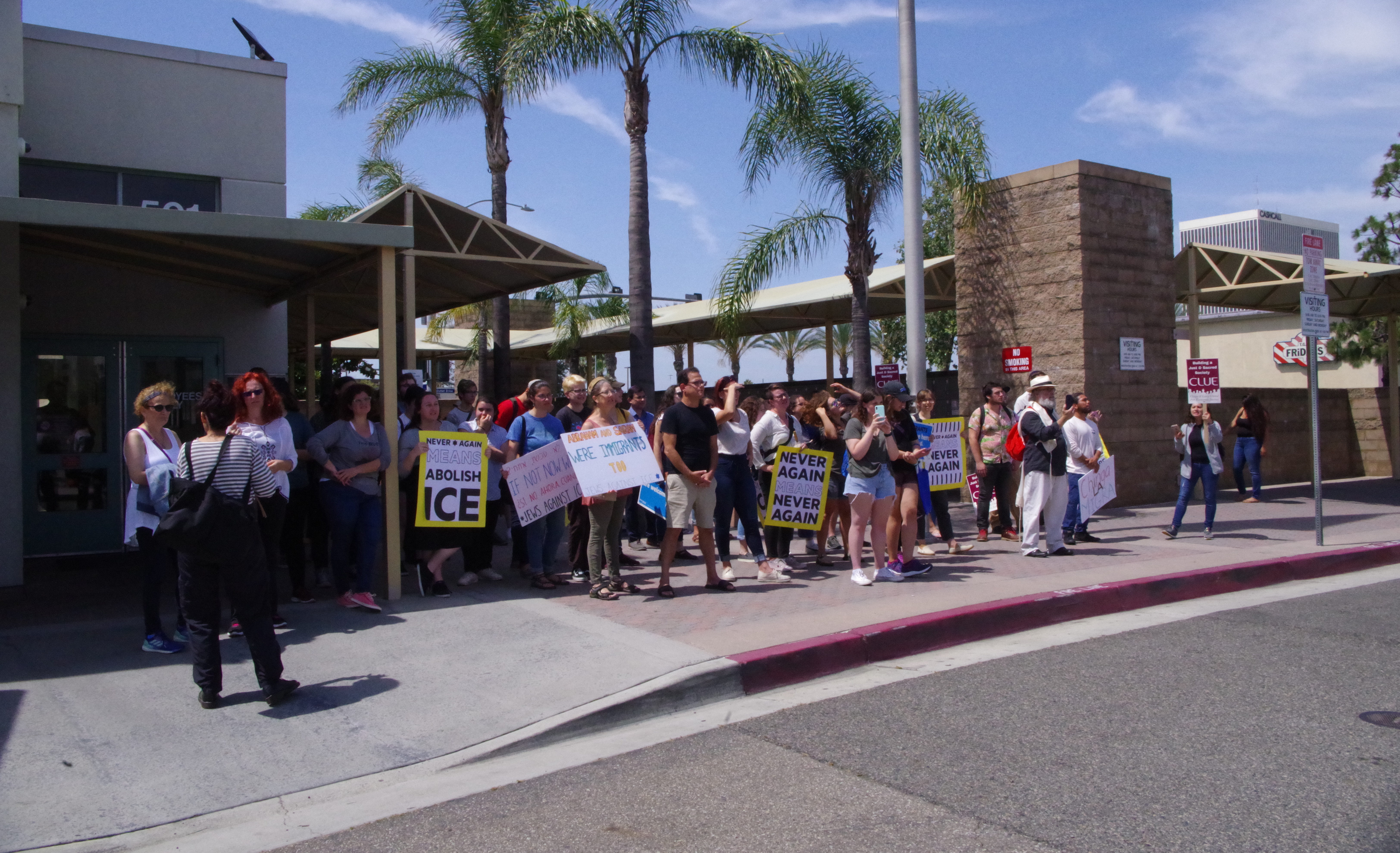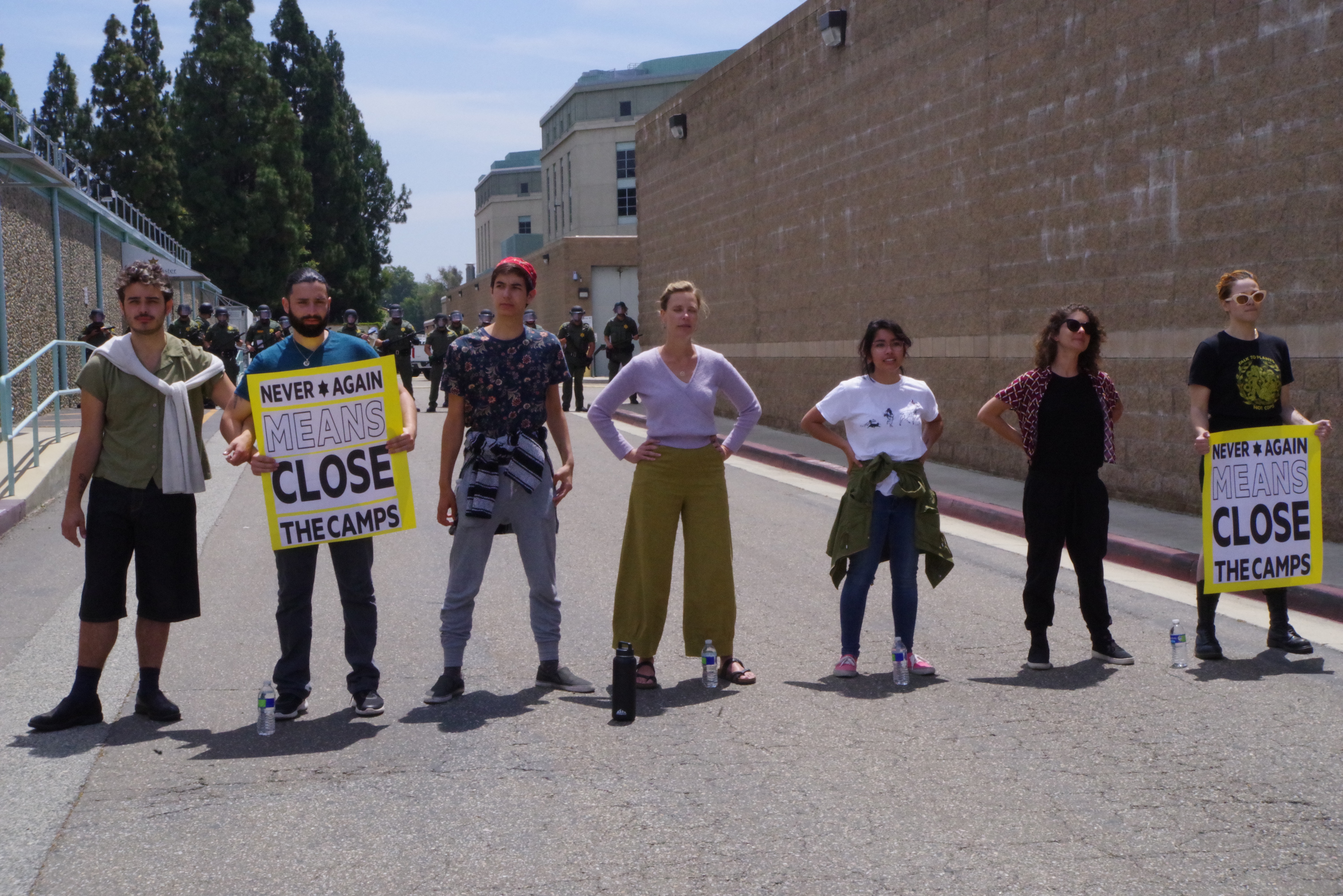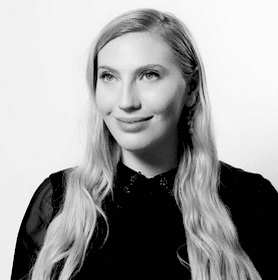 Photo by Ariel Sobel
Photo by Ariel Sobel In recent issues of this publication, several op-eds have debated whether it is appropriate to call migrant detention centers “concentration camps.” There’s no doubt the controversy has consumed airtime that could have been used to discuss the inhumane conditions in these compounds. Border detention centers are overcrowded and squalid; migrants are held in standing-room-only cells; children go without showers and hot meals; and according to the Office of Inspector General (the Department of Homeland Security’s independent watchdog), guards allegedly are attacking and raping women.
According to The New York Times, when people came to inspect these conditions, “migrants banged on cells and pressed notes to windows begging for help.”
Never Again Action, a series of Jewish-led protests against detention centers and government offices, is looking to answer those calls for help. Its goal is to shift the conversation from whether calling these facilities concentration camps is accurate, back to the individuals facing human-rights abuses inside the centers.
After 36 Jews were arrested on Jun. 30 while protesting a detention center in New Jersey, carrying signs that read “Never Again Is Now,” I was moved. For the first time, I was seeing meaningful action against not only the mistreatment of migrants, but the exploitation of real Jewish pain by conservative gentile politicians to silence opponents such as Rep. Alexandria Ocasio-Cortez (D-N.Y.) who (even if flippantly) dared to speak out against it.
After attending a protest this week with Never Again Action in Orange, Calif., sitting through its participant training and interviewing many of its protesters and organizers, I’m not sure if I’d still call the movement meaningful. But it is one hell of a photo op.
Serena Adlerstein came up with the concept. She is a full-time organizer with Movimiento Cosecha, a nonviolent movement fighting for the permanent protection, dignity and respect of undocumented immigrants. She’s now one of the three lead organizers of Never Again Action.
“I live and work with the undocumented community every day in my role at Cosecha, and it was really clear that national attention was shifting to the daily atrocities that the undocumented community faces,” Adlerstein explained during an informational call on July 1. “I could just feel in my bones the question that I asked myself in 2016 when (President Donald) Trump was elected: If I were alive during the Holocaust, what would I do?”
“That night, we were on a call and the next day, we put up a form and got 500 sign-ups and six days later, 36 Jews got arrested in front of Elizabeth Detention Center here in New Jersey.” — Serena Adlerstein, Never Again Action co-leader
This question is all too familiar for many American Jews; more than 400 had called in to learn more about the quickly growing movement, which had more than 3,000 sign-ups by the time of my call. This momentum is explosive given Never Again Action’s grassroots origin.
“I put up a Facebook post basically calling Jews to occupy detention centers across the country, not thinking much of it, and then a few folks who also happened to be amazing organizers commented, ‘I’m in, but for real,’ ” Adlerstein said. “That night, we were on a call and the next day, we put up a form and got 500 sign-ups and six days later, 36 Jews got arrested in front of Elizabeth Detention Center here in New Jersey.”
Now her organization has raised $177,122 on GoFundMe to pay legal fees for bail and court costs for its members committing civil disobedience.
Unlike many other protests, Never Again Action is not an arm of another organization. “We came together as a group of individual Jews who are affiliated with different groups. We wanted this to come from the Jewish community, not an organization,” Adlerstein said.
Seventy-five members of the Jewish community came together on July 3 to protest outside the Theo Lacy Facility in Orange, Calif., which houses immigrants whom U.S. Immigration and Customs Enforcement (ICE) has detained. Unlike the detention facilities by the border, inmates have access to “television, outdoor recreation, local newspapers, mail and commissary purchases” reports the Orange County Sheriff’s Department, as well as access to “medical, dental and mental health care.”

“The goal is to make business as usual harder for ICE and border patrol,” said onsite Never Again Action spokesperson Jamie Goodman. “We want to get the message out. We’re here as Jews to show our support for organizations like Movimiento Cosecha.”
When faced with today’s events, she found herself asking what she would have done if she had lived through the Holocaust. “The dehumanization feels like what led up to the Holocaust. I don’t want that to happen again,” Goodman said. “I don’t want to be a ‘good German.’ I don’t want to be a bystander.”
While protesters collectively felt the action was living out the mission of Never Again, they had mixed views on whether it’s accurate to call the detention centers “concentration camps.”
Rabbi Aryeh Cohen of Bend the Arc, a Jewish social justice organization, believes the term is spot on. He said, “The fact that my government, in my name, is caging children, is forcing adults to sleep on cold floors in camps that can only be described as concentration camps, which is part of American history — Japanese Americans — and part of our history, the only thing to do is come out and say that this is not happening in my name.”
Other protesters disagreed.
“I’m very hesitant to call the detention centers concentration camps. In my mind, a concentration camp is a place you go before you kill someone. It was a part of the Final Solution,” said Anna Bane, 18, who brought her parents to the protest. “While these camps are deplorable and I find everything wrong with them, I don’t know if I could call them concentration camps. That’s not to say that they don’t disgust me.” However, Bane agreed that she could comfortably invoke the phrase “Never Again.”
For Dan Lark, an incoming doctoral student at the University of Southern California’s School of Cinematic Arts, they clearly are concentration camps, but the debate gives people the comforts of denial. “It has to do with the fear that if we are right, then what do we do? If we’re right and it is the case, then we know that it’s so serious that it requires absolute outrage in the form of direct action because it’s just untenable. Because the idea of concentration camps themselves are untenable,” Lark told me. “But if we say that they are not concentration camps, maybe we can put it off for just a little bit longer doing something else.”
Dehumanization is the core link between the American government and the Nazi regime. Victims of both the Holocaust and family separation and detention experience the denial of their basic humanity — even if that’s to vastly different degrees.
“‘Concentration camps’ seems very apt. There are people being concentrated into a small area, being held indefinitely in detention and dehumanized,” Goodman said on behalf of Never Again Action. Asked how the organization feels about multiple Holocaust survivors who have come out against the comparison, even calling it “evil,” Goodman said, “A number of historians and other very smart people have agreed that they would count as concentration camps. I think we should listen to [Holocaust survivors] and strongly consider it. Some people are always going to have issues with the way you go about it, but it just seems … I don’t know if I have a good answer.”
Ten minutes later, Goodman returned and said she “found a link that showed me that 140 Holocaust survivors said, ‘Yes, call them concentration camps.’ Just because there is one person who doesn’t feel that way, there are others who want the term to be used that way.”
“The dehumanization feels like what led up to the Holocaust. I don’t want that to happen again. I don’t want to be a ‘good German.’ I don’t want to be a bystander.” — Jamie Goodman, Never Again Action spokesperson
The link refers to 140 historians who specialize in researching the Holocaust and other genocides that have come out against the U.S. Holocaust Memorial Museum for criticizing Ocasio-Cortez’s dubbing the centers as concentration camps, not actual survivors of those atrocities.
But for others, the semantics come second to the mistreatment of migrants.
The appeal for Rabbi Jill Zimmerman was that Never Again Action was trying to end the debate. “This new movement subverted that controversy, which I think is ridiculous, about whether or not they’re concentration camps, which is just a deflection about what is going on. I don’t really care what you call them,” she said. “I need to focus on the issue of children in cages.”
However, Never Again Action might have ignited another debate — about its involvement with anti-Israel activists. Many prominent members of the anti-occupation group IfNotNow are associated with the group on social media.
At the training in Southern California, the two people leading the organization were members of the anti-Israel group IfNotNow. During the opening remarks, when asked if Never Again Action will take a stance on Israel, the organizers said this was to criticize America’s policies, not what is going on in the Middle East.
Never Again Action has not adopted IfNotNow’s platform, but it has adopted its tactics. At the first meeting, after singing IfNotNow’s fight song “We Will Build This World With Love,” the organizers prepared participants to get arrested, a tactic IfNotNow employs.

Twenty demonstrators stood in front of the employee entrance of the Theo Lacy Facility to block ICE employees from entering — seemingly disrupting business as usual. But organizers realized the employees were just going in through another door, and they directed the frontline protesters to stay where they were.
While people shared moving stories, speeches and sentiments, the action soon derailed. One protester misidentified as ICE officers, members of the Orange County sheriff’s office that had arrived on the scene. The crowd chanted, “Quit your job!” Asked afterward about the mistake, the protester said, “All cops are pigs.”
In retaliation to Never Again Action, ICE shut down all its processing. Family members of those detained began to ask protesters to leave so they could post bail for their loved ones. Unable to be arrested, organizers moved bodies into the center of the streets, where no cars were coming through, to “block people from entering.” Riot police came and stood 30 feet behind the protesters for half an hour.
Confronted by human-resources representatives of Theo Lacy and family members, Zimmerman urged organizers to end the protest, given that it was harming the people for whom the goal was to advocate. After a delay, they agreed.
Never Again Action may not be protecting the rights of migrants but the photos of Jews protesting their mistreatment bears great symbolism. Not only does it show the Jewish community cares about detention center cruelties, but it will not allow anyone to silence protest against them in our name. But the protest was just as much about the meaning of the Holocaust as it was about protecting those detained by ICE.
“I was raised with the Holocaust shoved down our throats at every opportunity institutionally, for better or worse. I don’t think all of it was necessarily negative, but a lot of it was certainly gratuitous,” Lark said on the way to the detention center. “What was the point of raising generations of children to be anxious and hypervigilant about genocide and the Holocaust if we don’t actually point out the signs when they see it happening right before our eyes?”
But for Liam Davis, a Jewish Japanese American protester who risked arrest, the point was clear. “Carrying the history of Japanese internment and Jewish internment was really difficult for me growing up. My parents instilled in me this idea that you need to watch out and make sure you have a plan because if something happens, there’s never been anyone there for us before and there will never be,” the 20-year-old said, his back pressed against the door of the detention center. “I’m here because they’re wrong.”
Ariel Sobel is a screenwriter, filmmaker and activist, and won the 2019 Bluecat Screenplay Competition.























 More news and opinions than at a Shabbat dinner, right in your inbox.
More news and opinions than at a Shabbat dinner, right in your inbox.